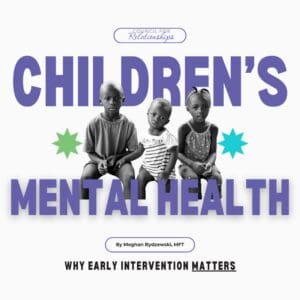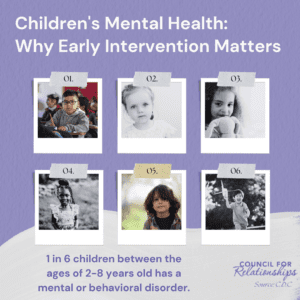Children’s Mental Health: Why Early Intervention Matters
Understanding children’s mental health is crucial for early intervention. This blog highlights the importance of child therapy, signs of mental health issues, and how to support a child. Promoting mental health awareness for children and informed parenting and child mental health can make a significant difference in their well-being.
 Why Early Intervention Matters
Why Early Intervention Matters
Mental health awareness is essential to me, not only as a clinician but also as someone who experienced mental health challenges as a child. This is why I know it is crucial to get children the help they need at a young age when signs show that they are struggling. According to the data from the C.D.C., one in six children between the ages of two and eight has a mental or behavioral disorder, and anxiety and depression in children increased from 5.4% to 8.4% in the last 10 years.
Parents or guardians must be listening and aware of what is happening with their children at all times. Just like if a child complained about a stomach ache for a week, the parent would most likely take their child to the pediatrician’s office to get it checked out. It is also important that parents who are together or co-parenting are on the same page about getting their children the help they need. Suppose one parent isn’t in support of their child going to therapy. In that case, this can impact the child and possibly increase their anxiety or increase feelings of hesitation to want to start therapy.
Recognizing Signs of Mental Health Issues in Children
Suppose a child is reporting or showing signs of increased anger, sadness, outbursts, lack of desire to participate in things they once enjoyed, or showing physical symptoms such as throwing up, headaches, or crying more than usual. In that case, it is also important that parents take their children to get the help they need for their mental health. Mental health and physical health go hand in hand. It is also important to note that not all signs and symptoms will be the same for every child; they vary.
Supporting Your Child Through Mental Health Challenges
Suppose there are changes in the household, such as a separation or divorce, a parent having a new partner, a new child coming into the house, or any change that feels like a shift in the system. In that instance, it is important to address it with your child and ensure they are getting the support they need.

Infographic by Council for Relationships
The Importance of Early Intervention and Therapy
It is also important that parents get the support they need as well, as it is difficult to witness your child experiencing these uncomfortable symptoms. It can take a toll on parent’s mental health as well, so I highly encourage finding a support system that supports the parents as well as the children. The children will tend to look toward the parents for support, so the parent/parents must be taking care of their own mental health as well so they can best support themselves and their child.
There are things we can do today to promote mental health care and continue to try to de-stigmatize going to therapy. Putting a child in therapy who is struggling provides them with coping skills, as well as tools they can use to handle their emotions more constructively. Learning how to be in control of your emotions can take years for us to learn, starting early can have many benefits.
Resources for Children’s Therapy Services
Another way we can honor this important day is to let children who have already been diagnosed or who have been struggling with mental health issues know that you are there for them and let them know that they are not alone. Letting children know you are there for them when they need it can offer comfort and security.
Supporting children daily can improve mental health care overall and create awareness for the individuals who need support.
Mental Health for Kids: Why Awareness Matters
Mental health awareness for children is essential, as early intervention can make a significant difference. Recognizing the signs and understanding the importance of child therapy can help parents take the necessary steps to support their kids.
How to Support a Child with Mental Health Issues
Parents play a crucial role in supporting their young people’s mental health. By staying informed about parenting and child mental health, they can provide the necessary environment for their children to thrive. Ensuring that both the child’s and the parent’s mental health needs are met creates a supportive framework for everyone involved.

Therapist Meghan Rydzewski, MFT
About Philadelphia Therapist Meghan Rydzewski, MFT
Meghan Rydzewski, MFT, is a Staff Therapist at the Council for Relationships who sees individuals, couples, and families in Philadelphia, Voorhees, NJ, and online. She is dedicated to improving mental health for kids and understands the importance of child therapy. Meghan specializes in how to support a child with mental health issues, ensuring comprehensive care for mental health awareness for children. Request an appointment with her today.
Let CFR’s over 85 individual, couples, and family therapy experts help you deal with painful emotions and other mental health conditions. Meghan and her colleagues are well-versed in parenting and child mental health, providing the best care for families in need. See our Therapist & Psychiatrist Directory for CFR therapists or psychiatrists near you.
If this is an emergency, please call 911 or contact the National Suicide Prevention Lifeline by dialing 988.
More Mental Health Blogs from CFR
CFR’s therapists, psychiatrists, and other mental health professionals offer much more to explore! Check out the CFR Expert Voices blog for great mental and emotional health advice on topics such as social skills, helping young people thrive in the age of social media, common mental health problems, and navigating complex relationships with family members. To get first access to our Expert Voices blog, join our mailing list!
